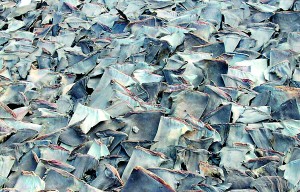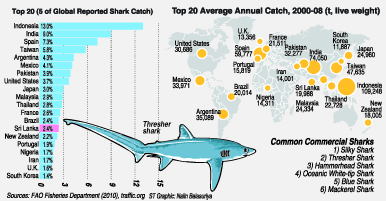News
Lanka among world’s top 20 shark killers
An international study has placed Sri Lanka among top 20 countries that catch sharks.
Noting that these 20 countries account for 80% of the world’s annual shark catch, a report based on the study puts the survival of many shark varieties in their hands.

Shark fins laid out to dry in Negombo
This report titled “The future of the Shark: A Review of Action and Inaction” was produced by the wildlife trade monitoring network TRAFFIC, and the Pew Environment Group. It analysed shark, ray and skate catch data provided by countries to the Food and Agriculture Organisation (FAO).
TRAFFIC’s Global Marine Programme Leader Glenn Sant said, “Countries need to take action to stop the decline in shark populations and help ensure that the list of species threatened by overfishing does not continue to grow.”
Placing Sri Lanka in the 14th place, the report says Indonesia, India, Spain and Taiwan account for more than 35% of the total shark catch. Though Sri Lanka’s contribution to the global catch is only 2.4%, it is still a significant quantity, given the size of the country and its fishing fleet.
Sharks are particularly vulnerable to overexploitation because of their biological characteristics of maturing late, having few young and being long-lived. Worldwide, shark populations are in decline due to unregulated fishing, much of it to meet the high demand for fins.
About 60 species of sharks populate in Sri Lanka’s waters and its exclusive economic zone. According National Aquatic Resources Research and Development Agency (NARA) fish expert Rekha Maldeniya, silky shark leads Sri Lanka’s shark catch. About 70% of the catch consists of silky shark, followed by thresher shark and hammerhead sharks.
Thresher shark, identified as a threatened species, was caught despite a government ban.
Oceanic white-tip shark, blue shark and mackerel shark are the other common species with commercial value, according to the Fisheries Department.
The Convention on International Trade of Endangered Species (CITES) held in Bangkok, Thailand in March this year declared the oceanic white-tip shark, three species of hammerhead sharks and manta rays as protected species. Accordingly, trade of these species requires a CITES permit. As a signatory to the convention, Sri Lanka will also need to take measures to regulate fishing of these species.
In Sri Lanka, the sharks are mostly a by-catch, says Dr. Maldeniya. But there are dozens of fishing boats particularly targeting sharks for fins which have a big export market. The long-line fishing method — that has several hooks attached to a line — is being widely used for shark fishing.
 The Sri Lankan section of the report says that sharks are also caught as by-catch in bottom-set gillnet fishing, the bottom-set long-line fishing and the beach seine fishing.
The Sri Lankan section of the report says that sharks are also caught as by-catch in bottom-set gillnet fishing, the bottom-set long-line fishing and the beach seine fishing.
Dr. Maldeniya says Sri Lanka has started a National Plan of Action for sharks. This has been initiated with assistance from the Bay of Bengal Large Marine Ecosystem (BOBLME) Project. The project aims at identifying shark species, their composition, possible breeding grounds and other factors which are relevant to shark conservation.
The NARA expert says the project also recommends policies to protect not only sharks but also the livelihoods of fishermen.
Sharks play a crucial role in sustaining the ocean environment. Where shark populations are healthy, marine life thrives; but where they have been overfished, ecosystems fall out of balance.
Follow @timesonlinelk
comments powered by Disqus

